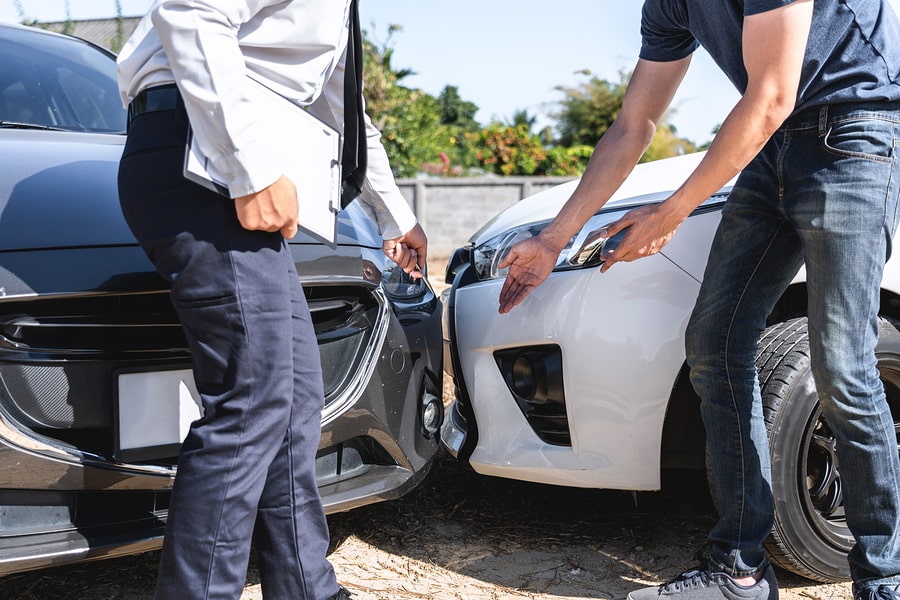
If you were in a traffic accident, especially if you were injured, you may have many questions running through your mind. You might wonder what you should do next, especially if you are injured. You might wonder if you are okay, or if your passengers are okay, or if your car can be fixed, or how you will get another if it can’t be fixed, or if you were at fault, or how much money this accident will cost you.
You might wonder a lot of things. But afterward, especially if you learn you were not at fault, you might wonder how car accident settlements work. When your injuries are treated, and your passengers turn out to be fine, and the other driver turns out to be at fault, that’s when you might start to wonder how car accident settlements work. You can take steps after the impact of two (or more) vehicles that will actually help your car accident settlement work. So what are those steps?
For further information or assistance on car accidents and who’s at fault in Georgia, contact an experienced Georgia car accident attorney today.
Information Is King in Car Accident Settlements
If you are injured in an accident that is not your fault, you have a significant task in front of you. That task begins before the dust even settles from your accident. Obviously, you should obtain first aid for your injuries and, if necessary, go to the hospital for further care.
However, if you can, you should:
- Take pictures of the accident scene, being sure to capture the relative locations of the vehicles and the damage to vehicles involved.
- Obtain contact and insurance information for any other drivers involved in the accident.
- Get contact information for any passenger in any of the vehicles involved.
- Get contact information for any witnesses present who were not involved in the accident.
- Note the locations of any surveillance cameras that might have captured some or all of the accident. If they are located at private businesses, note the names of the businesses. You will want to contact them later.
- File a statement with the police on the scene, if there are any, and file a police report later if no police report to the scene. Usually, if someone sustained injuries, police will respond.
- Notify your insurance company of the accident.
You will need all the information you gather to assist you later in settling your claim. You also should go to a doctor as soon as possible, even if your injuries did not require a visit to the emergency room or hospitalization. You should get a thorough medical exam to determine if your injuries are more serious than you might have at first believed. Many injuries, including whiplash and mild traumatic brain injuries, often do not manifest symptoms immediately.
They can have long-lasting complications, however, including:
- Headaches
- Loss of memory
- Difficulty concentrating or paying attention for extended periods
Keep detailed documentation of your injuries, treatment, and other medical care and expenses that result from your accident. This applies to ongoing medical expenses if you suffer injuries with long-lasting consequences or that require continued treatment. To complete your claim documentation, you should get two estimates of the damage to your vehicle. All of this information is critical to receiving a settlement that provides you with the maximum possible compensation.
As soon as possible after your accident, you should contact the other driver’s insurance company and notify them of your property damage and personal injury claim. The goal from the initial contact is simply to notify them that you have a claim. You don’t need to provide full or final details of your claims when you notify the other driver’s insurer. That can come later, but it is important to put the insurer on notice regarding your claim.
After an accident, don’t try to handle the claims process yourself, especially if the insurance company has indicated that it wants to settle your case. Insurance companies do everything they can to minimize what they pay out, even on completely valid claims. For this reason, it is highly advisable to retain an attorney as soon as you can after an accident. A lawyer familiar with the insurance claims process will protect your rights and ensure that you get the compensation you deserve.
After Your Accident, the Settlement Process Begins
Once you notify the other driver’s insurer of your claim, it will quickly become apparent why you gathered all that information in the minutes and days after your accident. Your lawyer will send the insurer a letter describing your injuries and property damage from the accident, with a tally of your financial damages for medical expenses, any out-of-pocket expenses you might have stemming from the accident, lost income from missed work, and repair costs for your vehicle.
The other driver may lack insurance or enough insurance. They might have presented you with old or invalid insurance information. More likely, they have insurance coverage with limits that are too low to cover your damages, medical or property. In either case, you will have to file a claim with your own insurer against your uninsured/underinsured policy. That is as simple as calling your own insurance company to file a claim.
However, claims adjusters adjust. All the problems you might encounter with the other driver’s claims adjuster might apply to your talks with your own insurer. Fortunately, a lawyer can help you deal with your own insurance company just like they can with someone else’s.
After your attorney sends your claim letter, the claims adjuster for the other driver’s insurer will send a response, assuming the claims adjuster didn’t send you the company’s assessment of your claim before you sent your letter. It is possible—even likely—that the insurer’s offer of settlement will be low. If that is the case, this is where things will get interesting. At the very least, the insurer will send you a reservation of rights letter. This letter will simply acknowledge that they have received your claim and are willing to discuss it with you, but without accepting that your claim is accurate.
Insurance companies make money on their investments. Most of them lose money on their underwriting business—that is, the claims they pay out to or on behalf of the drivers they insure. However, that doesn’t mean they don’t take steps to limit those payouts. They are extremely likely to make a low initial offer, and they may refuse to budge enough off of that initial offer to make a settlement offer you consider reasonable.
Low-dollar claims are likely to settle quicker and more easily, but if you have suffered injuries, particularly serious or long-term injuries, the adjuster is likely to resist paying what you might consider fair. It’s not personal, it’s just business. Even so, if the insurance company seems unwilling to make what you consider a reasonable offer, your lawyer may go ahead and file a lawsuit. If this occurs, it does not necessarily mean your case is going to trial. Settlement negotiations typically continue while a case is pending, and personal injury lawsuits have certainly settled on the courthouse steps in the past.
What Happens if You Can’t Reach an Agreeable Settlement?
If you send your claim letter with a summary of your damages and the insurance adjuster’s response is not satisfactory, you have options other than taking a low offer. You could provide the insurance adjuster with all your documentation of damages, the police report from the accident, witness statements you or your attorney gathered using the contact information you gathered at the scene of the accident, and, if available, surveillance camera footage from the scene.
If none of this results in a reasonable settlement offer—one that, for instance, includes consideration for pain and suffering as well as future medical costs likely to stem from your accident, if appropriate—it might be time to take talks to another level and file a lawsuit.
One study by the federal Bureau of Justice Statistics concluded as few as 3 percent of personal injury cases go to trial. Counter to that, a law review paper by a professor at Cornell University Law School published in 2009 determined that, based on its sample of cases, it is unlikely that the settlement rate for personal injury cases is higher lower than 90 percent. The paper’s research found that it is possible settlement rates could be as high as 87 percent in personal injury cases. The paper also noted other studies exist that found settlement rates as high as 95 percent but questioned their results.
Whoever is right, it seems clear that settlement rates for injury lawsuits are very high. Those settlements can occur at any point from the filing of the lawsuit until right before the jury returns with a verdict. Filing a lawsuit is not the end of settlement talks. In many cases, it is just the beginning.
How Does a Lawsuit Work?
The process of suing someone in civil court, which is where your traffic injury case would be filed, is well-established. Everything is governed by state rules of civil procedure, including timelines, but most states provide room within the rules to lengthen the amount of time allowed if all parties agree.
The basic steps include:
- Filing a complaint, which lays out your claims. The defendant—the driver who was at fault in the accident, not the insurance company under most circumstances—has a set period of time to respond once the complaint is served. Usually, this is 30 days. Some states have longer periods, and some others allow extensions.
- The plaintiff—that’s you—can file discovery requests either at the time the complaint is filed or later, but usually within a fairly short period of time after an answer is filed. Both sides can file discovery requests. The sides will meet with the court to agree on a discovery timeline. Discovery, which involves written questions, requests for documents, and depositions of witnesses, can take as little as a few months up to a year or more. It all depends on the complexity of the case, whether expert witnesses are involved, and how contentious the parties choose to make the litigation.
- Trial. For a traffic accident, most trials take only a day or two. Once again, though, it depends upon the complexity of the case and whether expert witnesses are involved.
Usually, there is a settlement before trial, and certainly before the case comes back from the jury. If not, the case will proceed to a verdict, and someone will win. The losing party can appeal, but they must have grounds. They also must deem the appeal to be worth the cost.
Accident Victims Should Retain an Attorney
The process of settling a personal injury claim is extremely complicated, and insurance companies do everything they can to pay claimants as little as possible to go away.
Some common tactics they use include:
- Making unreasonably low settlement offers
- Waiting until victims are facing significant medical bills before making an offer
- Making an offer before victims have a chance to talk to an attorney
- Misrepresenting victims’ legal rights
- Suggesting that retaining a lawyer will only hurt their claims
A lawyer familiar with these and other insurance company tactics will protect your rights. An added benefit is that once you retain a lawyer, the insurance company will communicate directly with your attorney, allowing you to focus on your recovery and well-being. To learn more about how an attorney can help you settle your claim, contact a lawyer near you today.


